Related Research Articles

The University of Dubuque (UD) is a private Presbyterian university in Dubuque, Iowa. About 2,200 students attend the university.

The College of Wooster is a private liberal arts college in Wooster, Ohio. Founded in 1866 by the Presbyterian Church as the University of Wooster, it has been officially non-sectarian since 1969. From its creation, the college has been a co-educational institution. It enrolls about 2,000 students and is a member of The Five Colleges of Ohio, Great Lakes Colleges Association, and the Association of Presbyterian Colleges and Universities.

Maryville College is a private liberal arts college in Maryville, Tennessee. It was founded in 1819 by Presbyterian minister Isaac L. Anderson for the purpose of furthering education and enlightenment into the West. The college is one of the 50 oldest colleges in the United States and the 12th-oldest institution in the South. It is associated with the Presbyterian Church (USA) and enrolls about 1,100 students. Its mascot is the Scots, and sports teams compete in NCAA Division III athletics in the Collegiate Conference of the South.
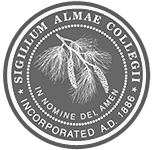
Alma College is a private Presbyterian liberal arts college in Alma, Michigan. It enrolls approximately 1,400 students and is accredited by the Higher Learning Commission. Alma College is affiliated with the Presbyterian Church (USA) and offers bachelor's degrees in multiple disciplines as well as four master's degree programs. Its athletics teams, nicknamed the Scots, are part of the National Collegiate Athletic Association (NCAA) – Division III and the Michigan Intercollegiate Athletic Association (MIAA).
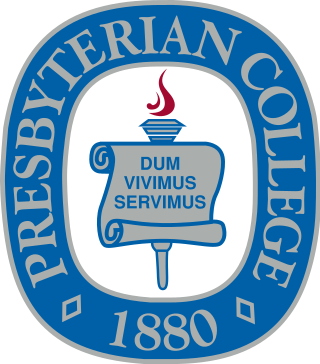
Presbyterian College (PC) is a private Christian liberal arts college in Clinton, South Carolina, United States. It was founded in 1880 and is affiliated with the Presbyterian Church (USA).

Westminster College is a private, liberal arts college in New Wilmington, Pennsylvania. Founded in 1852, it is affiliated with the Presbyterian Church (USA). The student population is approximately 1,307 undergraduate and graduate students.

Albright College is a private liberal arts college in Reading, Pennsylvania. It was founded in 1856.
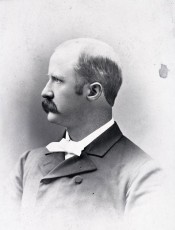
Walter Quincy Scott was an American educator who was the second President of Ohio State University and the fifth principal of Phillips Exeter Academy.
Josiah Calvin McCracken was an American football player and track and field athlete.
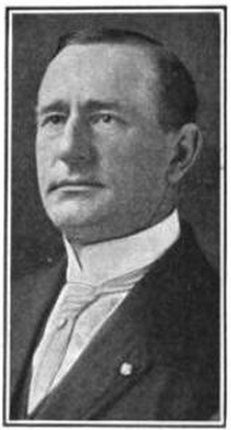
Charles Otis Bemies was an American football, basketball, and baseball coach and Presbyterian minister. He became acquainted with James Naismith while studying at Springfield College in the late 1880s. While serving as the athletic director at Geneva College, he organized the first college basketball team in 1892. He graduated from the Western Theological Seminary and was ordained as a Presbyterian minister in 1897. From 1899 to 1901, he served as the first basketball and second football coach at Michigan Agricultural College. After retiring from coaching, Bemies served for many years as a Presbyterian minister and evangelist in rural Pennsylvania. He was also active with YMCA, serving with that organization in Russia in 1918 and in South Dakota in the early 1920s. Bemies lived in Minneapolis, Minnesota, in his later years and died there in 1948. He was posthumously inducted into the Beaver County Hall of Fame in 1992.
William McMillan was elected the fourth president of Jefferson College on September 24, 1817.

Frederick William Hinitt was the 4th president of Washington & Jefferson College.

Johnson Crayne Smith was an early 20th-century businessman from Pittsburgh and the namesake of Johnson C. Smith University.

John McMillan was a prominent Presbyterian minister and missionary in Western Pennsylvania when that area was part of the American Frontier. He founded the first school west of the Allegheny Mountains, which is now known as John McMillan's Log School. He is one of the founders of Washington & Jefferson College.
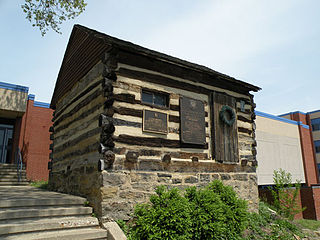
The history of Washington & Jefferson College begins with three log cabin colleges established by three frontier clergymen in the 1780s: John McMillan, Thaddeus Dod, and Joseph Smith. The three men, all graduates from the College of New Jersey, came to present-day Washington County to plant churches and spread Presbyterianism to what was then the American frontier beyond the Appalachian Mountains. John McMillan, the most prominent of the three founders because of his strong personality and longevity, came to the area in 1775 and built his log cabin college in 1780 near his church in Chartiers. Thaddeus Dod, known as a keen scholar, built his log cabin college in Lower Ten Mile in 1781. Joseph Smith taught classical studies in his college, called "The Study" at Buffalo.
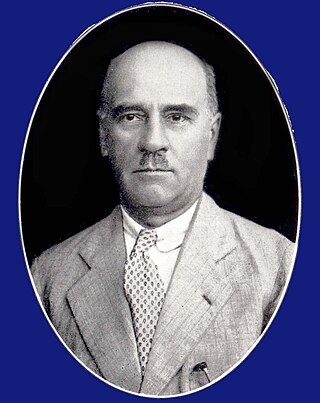
John Lawrence Goheen was an American missionary, educator and administrator, agriculturist, social worker, and writer who spent most of his career working in India. He made a major contribution to literacy through the Bombay Literacy Campaign of 1939. He established Adult Education Associations in various parts in India with a slogan "Every home a literate home". He promoted religious organizations for literacy conferences. Goheen was also a college football player and coach in the 1900s.

Frank Nicholas Wolf was an American football and basketball player and coach. He served as the head football coach at Waynesburg College—now known as Waynesburg University in Waynesburg, Pennsylvania, from 1921 to 1922 and again from 1928 to 1941, compiling a record of 65–63–10.

Charles Frederick Wishart (1870–1960) was a United States Presbyterian churchman who was President of the College of Wooster from 1919 to 1944. In 1923 he defeated William Jennings Bryan to become Moderator of the General Assembly of the Presbyterian Church in the United States of America at the height of the Fundamentalist–Modernist Controversy.
Arthur Edward Steele was an American minister of the Bible Presbyterian Church and a Christian educator who served as president of Shelton College and then founded Clearwater Christian College.
Frank Louis Tinkham was an American college football and college basketball coach.
References
- ↑ "Kinley McMillan - Class of 1886". shootermcgavin.com. Retrieved April 24, 2019.
- ↑ Minutes. Presbyterian Church in the U.S.A. 1889. Retrieved April 27, 2019.
- ↑ "Wooster Football Results". Wooster Fighting Scots football . Retrieved April 27, 2019.
- ↑ "Kinley McMillan - Class of 1886". shootermcgavin.com. Retrieved April 24, 2019.
- ↑ Old Home Week Book, McKeesport, Pennsylvania. Nicholas Printing. 1910. Retrieved April 24, 2019.
- ↑ Reports of the boards, Issue 24. Presbyterian Church in the U.S.A. 1894. Retrieved April 24, 2019.
- ↑ "W Association Hall of Fame Members". Wooster Fighting Scots . Retrieved April 24, 2019.
- ↑ "Kinley McMillan - Class of 1886". shootermcgavin.com. Retrieved April 24, 2019.